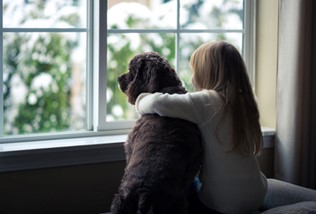My very dear friend is a horse whisperer, who has helped many children with Post Traumatic Stress Disorder (PTSD) heal. One day while having lunch together, I asked her to explain to me why animals, and horses in particular, help children with PTSD recover. She explained to me that children of abuse and domestic violence, as well as children who have physical and emotional challenges, respond to horses (and other animals) because they intuitively recognize that they can trust them.
Children who are emotionally and physically injured and abused have no voice, and often are emotionally and physically paralyzed, unable to express themselves. These children are frozen, and yet, as they sit astride a big, powerful horse, they learn to trust once again, relax and surrender to the movement of their new ally. A horse neither judges nor criticizes, but loves unconditionally. And not only does he respond with nonverbal cues, such as sound, nuzzling, and picking up his ears, but he is also honest, and will not let your child get away with anything – no deception, no deceit. Further, because a child burdened with either physical or emotional challenges or abuse is often cloaked in dishonesty, he may encounter for the first time, a friend whom he can count on to not let him down.
When a horse carries your child, who feels small and powerless, his very movement relaxes your child and restores control through action. And when riding his horse, your child can find a safe place of unconditional acceptance and love with his best friend and therapist…his horse.
The history of mankind’s initial connection with domesticated animals has long been debated, but a discovery in Israel of a man buried with his arms around a wolf-pup dating back 12,000 years, may be evidence of just how long ago humans discovered the benefits of having pets. Today, many families love their pets and consider their pets to be members of their own families. Whether you choose a cat, a dog, a horse, or a rabbit, the benefits to raising children in a home with pets are great. With the pressure we are all under, social distancing and staying home and watching our economy slow down, there is a resurge of PTSD in homes around the country.
Here are some benefits to adding a pet to your family.
- Pets give unconditional love. They are non-judgmental, and, especially for only children, lonely children, or children who have sibling rivalry or emotional distress, a pet gives them someone to talk to. A pet can comfort, give support, and listen to a child’s troubles without judgment or consequence. And, when playing, a pet can become your child’s partner and best buddy.
- A pet can teach a child that he doesn’t have to take out his anger or fear on others. Some children become bullies and if they don’t have a safe place to share their truest emotions, they may project those emotions onto other children. Because a pet will love your child no matter what he says, a pet gives him a confidant, a safe place in which to verbally pour out his fears and his anger.
- A pet can teach empathy. Caring for a pet that is so dependent on you teaches empathy. Your child learns to read your pet’s needs: is he hungry? Does he need to go outside? Maybe the pet is scared of the wind, rain or snow and needs to be comforted. Moreover, empathy is the one skill that can be taught and a skill that bullies often lack.
- A pet can teach confidence and responsibility. Children can gain confidence by having the responsibility of caring for a pet. Children as young as three years old can manage simple tasks such as filling the pet’s water and food bowls. As your child gets older, he can groom and walk the pet.
- Animals can help socialize children and increase verbal skills. You’ve likely seen even little kids who are still learning to talk attempting to chatter away with pets. In this way, pets give not only social and emotional support but also cognitive language skill support to children. A pet’s simple presence provides verbal stimulus to help your child practice talking and socializing with another being.
- Pets (and animals in general) can be very therapeutic for children. Studies have shown how pets can help lower blood pressure, speed up recovery time, and reduce stress and anxiety. We see this with troubled children, Autistic children or children with Asperger Syndrome and PTSD — when they are with animals they can immediately relate because they sense the animals are unconditional in their love and affection.


